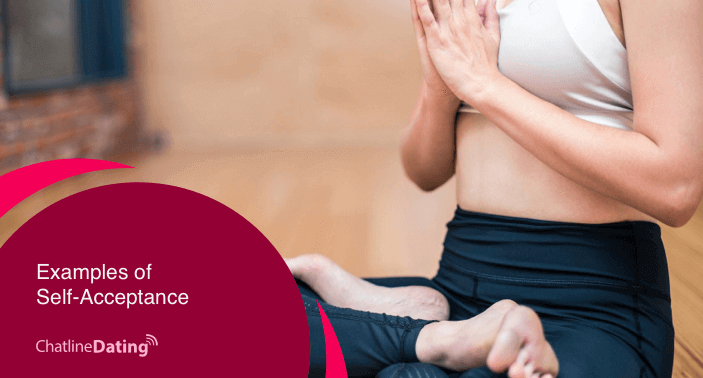Self-Acceptance Guide: The Key to Happiness

There’s a lot of buzz about self-acceptance nowadays that goes with the social media hype and pressure. As more and more people get hooked on various social media apps and the internet checking out what’s up with who, comparison becomes inevitable. This can significantly sway a person’s ability to embrace self-acceptance, because as the saying goes, “comparison is the thief of joy.”
If it’s true that self-acceptance is the key to happiness, what does it take to achieve it? How can you accept yourself completely and unconditionally? Let’s explore this subject further through this Guide to Self-Acceptance;
What is Self-Acceptance?
Self-Acceptance is an attitude or state of mind that involves complete acceptance of yourself – including your flaws, imperfections, and weaknesses. In the same way, it also refers to full awareness of your capabilities, skills, and strengths. It is essentially the act of embracing your uniqueness and totality as a person, believing that you are perfect in your way.
For some, self-acceptance means accepting what you can and cannot do, and what you are and what you are not; yet still appreciating yourself nonetheless. Self-acceptance is also a form of self-love because it goes hand-in-hand with knowing your worth and what you deserve. It puts your heart and mind in the right perspective knowing that you are in charge of your own happiness.
Examples of Self-Acceptance

1. Being in-tune with reality while maintaining a positive attitude.
Self-acceptance is being aware of the truth but still finding a way to stay positive. It’s like seeing the glass as half full instead of half empty by acknowledging the opportunities and not the obstacles.
2. Forgiving yourself for your past mistakes and wrong decisions.
We are all capable of committing mistakes at some point – in one way or another. Sometimes, our bad choices have serious consequences. Self-acceptance is not putting the blame on yourself but rather accepting them and charging everything to experience.
3. Not allowing your past to define who you are.
Whatever you did in the past is all in the past. Being wise enough not to let your past define you is an act of self-acceptance. Additionally, it doesn’t matter whether you have a bad family background or you grew up differently from others. What is more important is that you accept your past and that you’re not letting it stop you from living the best life you deserve.
4. Knowing that your opinion of yourself is more important than other’s opinions.
Self-acceptance is having a sense of security in who you are and what you are capable of. It means that what other people think of you doesn’t matter because what truly matters is how you see yourself. After all, no one in this world knows you better than yourself. Therefore, being wise enough to recognize that unsolicited opinions are insignificant is a form of self-acceptance because no one has the right to point out your flaws and insufficiencies just to pull you down.
5. Not dwelling on your regrets.
Accepting yourself means being mature enough to know that focusing on those “what might have been” and “if only” can keep you from seeing the opportunities that lie ahead. Clear enough, dwelling on your regrets can stop you from seeing your potential. Self-acceptance means putting everything behind you and using what you’ve learned to achieve what you want.
6. Focusing on your strengths, skills, talents, and capabilities.
The ultimate expression of self-acceptance is focusing on your abilities and using them constructively. Keep in mind that it is perfectly acceptable to embrace your strengths while being aware of your weaknesses. This is what makes you unique because that perfect balance is what makes you who you are. If you let your strengths shine brighter than your weaknesses, you’ll never lose your spark.
7. Striving to become a better person for self-fulfillment.
Strive to become a better person for yourself and not for others. Self-acceptance is the willingness to work hard to achieve a better version of yourself because it is essential to your happiness; and not merely to please other people or to make them happy.
8. Not comparing your life with others.
Comparison can steal away your joy and can keep you from appreciating what you already have or what you have already achieved. You have to accept that people manage their lives differently, and you can do the same with yours. So instead of making comparisons, appreciate what you have and use it to move forward and to make your own life better.
9. Getting rid of negative thoughts and wrong attitudes.
“I am not as good or as perfect as him/her”. This is the legendary line of those who cannot accept themselves for what they are. Ditch this attitude by getting rid of your negative thoughts. Start by saying, “I may not be as skilled as her, but I have my own abilities. I am capable of learning and becoming the best in my own way.” Evidently, self-acceptance is having a sense of reality, but appreciating yourself just the same.
10. Believing that you deserve to love, to be loved, and to be happy.
Self-acceptance means believing that you deserve the best things in life, despite your flaws and rough edges. It is being aware that you don’t have to conform yourself to others to find love. Therefore, believing that you deserve genuine love and happiness just the way you are, is the best way to accept yourself wholeheartedly.
11. Embracing your purpose.
Accepting and embracing your purpose in life is one of the strongest forms of self-acceptance. Whatever your path is, appreciating it and putting your heart into it can bring you inner peace and joy. Whether it is to care for a special child or serve your community, knowing your purpose and embracing it with all your heart is an act of self-acceptance.
Why Is Self-Acceptance Important?
Self-acceptance is important because it gives you a good sense of awareness about yourself while fostering self-love. It enables you to see yourself beyond your flaws and weaknesses. More importantly, it contributes to your purpose in life because it allows you to focus on your abilities and strengths instead of punishing yourself for what you cannot do or cannot achieve.
Many people put their attention too much on being just like the people they admire to find self-fulfillment. They strive to be just as rich, just as successful, or just as intellectual. While it’s acceptable to find inspiration in others, it is no longer healthy if it cultivates envy or keeps you from appreciating yourself.
Some people stereotype white as more beautiful than black or skinny as more desirable than chubby. Self-acceptance can defy all of these. It means loving and accepting yourself whether you conform to other people’s perceptions of beauty or not.
This makes self-acceptance significant for everyone because it can affect your life, decisions, happiness, and future. Accepting who you are and what you can do can have a strong impact on your life. It can help you overcome your insecurities and keep you from constantly comparing yourself or your life with others.
How to Achieve Self-Acceptance

Self-acceptance is an attitude, a mindset, and a way of life. If you are having trouble dealing with your imperfections and weaknesses, or you persistently blame yourself for all your troubles in life, it’s about time to break the habit. The truth is that there are many things you can do to find peace, joy, and contentment.
Why is it important to do this? It’s because you should be in charge of your own happiness. Your life should not revolve around comparisons, regrets, self-pity, and other people’s expectations. As long as you’re willing to take the first step and make small sacrifices along the way, you’ll find the right path towards self-acceptance. Here’s how;
1. Make daily affirmations.
Before you start your day: 1. Make daily affirmations to empower yourself. 2. Remind yourself that you are beautiful, capable, and deserving. 3. Repeat your affirmation until you feel a sense of positivity. It is also advisable to verbalize them or to write them down in your journal. Saying them out loud or reading them makes everything more plausible and imaginable. Here are some examples of daily affirmations;
- “I am beautiful. I am enough. I can do everything that I want.”
- “I have the power to change my life for the better and to make my dreams come true.”
- “Today, I will be victorious. I have everything I need to seize the day.”
- “Nobody can steal away my peace and joy. I deserve more, and I can be more.”
2. Stay away from things that feed you insecurities.
Stay away from anything or anyone that dampens your joy, such as social media, toxic people, and individuals that bring dark clouds to your day. If you find it difficult to avoid them completely, find a means to lessen your interaction with them.
Think of a coping mechanism that works best for you, like mind conditioning and self-control – anything that makes you feel better. The less affected you are by these negative thoughts and feelings, the sooner you’ll learn to accept yourself completely.
3. Read self-help books that encourage self-acceptance.
We can all benefit from various resources that are easily within reach. That’s how we acquire new knowledge and learn new skills. The same thing applies to self-acceptance. You can rely on self-help books that encourage positive thoughts and self-appreciation. Here are some highly-recommended books about self-acceptance;
- Workbooks for the Gifts of Imperfection by Brene Brown (2010)
- Love Yourself Like Your Life Depends on It by Kamal Ravikant (2012)
- Radical Acceptance by Tara Brach (2003)
- The Self-Love Experiment by Shannon Kaiser (2017)
- Self-Compassion by Kristin Neff (2011)
4. Work on your physical, mental, and emotional wellness.
Self-acceptance is a holistic process that involves the mind, body, and spirit. If you want to feel good about yourself, you have to invest your time and energy in your overall health and wellness. Here are some tips on how you can achieve this;
- Regular exercise: Our body releases the chemical endorphin that interacts with our brain’s receptors during exercise. This triggers a positive feeling in the body, which makes you feel good about yourself.
- Meditation: Before going to bed, practice the habit of meditating. This is a relaxation technique that can help you achieve a state of calmness. It also encourages better sleep. To meditate, think of positive thoughts and everything that you’re thankful for. You may also work on some breathing exercises to relax your mind and body.
- Spend time with yourself: Don’t feel guilty about spending some time alone to treat yourself. You can go for a quiet walk where you can get some fresh air, treat yourself to a fine lunch, enjoy a cup of coffee in a relaxing spot, or have a rejuvenating day at the spa. Treat yourself and enjoy a nice break from your everyday routine.
- Quit unhealthy vices: Self-acceptance is all about accepting yourself without any reservations. However, it also means taking care of your body. What better way to start than by quitting on all your unhealthy vices. Examples are; smoking, excessive alcohol drinking, use of drugs, unhealthy eating habits, and not getting enough sleep.
5. Focus on your strengths and abilities.
Keep in mind that you have your own talents, skills, and capabilities. Your imperfections, rough edges, and weaknesses are all part of who you are. They contribute to your uniqueness as a person and make your best qualities shine brighter. So put your positive attributes to good use by being productive, fruitful, and beneficial to others.
Always remember that your strengths and abilities should define you and not your weaknesses. To achieve this, you need to put your best foot forward all the time by accepting your limitations and recognizing your huge potential.
6. Recognize the people who love and care for you.
The road to self-acceptance may lead you to a lot of discoveries. And you can discover a lot of things about yourself (good and bad) through other people. Talk to people who have positive influences in your life, particularly those you admire and look up to, such as your parents, grandparents, life coach, childhood friends, closest cousins, and colleagues.
Engaging in meaningful conversations with people who truly care for you can help you learn and discover many new insights. It keeps you well-grounded and enables you to appreciate yourself the way they do. In the process, you learn from them and arrive at certain realizations that encourage self-acceptance.













